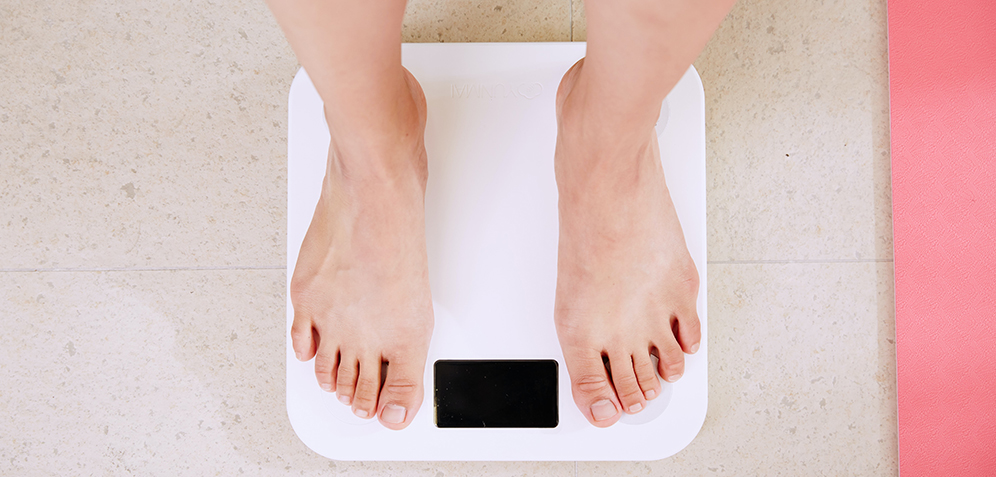Most people are aware that their weight has a positive or negative influence on their life. Being overweight, for example, is linked to many health problems, including heart disease, high blood pressure, cancer and a higher risk of Type 2 Diabetes.
While you may be aware of these common health concerns, have you considered how your excess weight could put you at risk of developing a hernia or complications from surgical repair? Our patients often ask us questions about the role their weight will play in regard to hernia repair surgery. We’d like to answer some of the most common questions concerning weight and hernia surgery.
Hernia surgery and Weight FAQs
Can you get a hernia from gaining weight?
Obesity raises the risk of developing hernias in the abdominal wall. Being overweight puts more strain and pressure on your abdominal muscles, making them weaker and more vulnerable to hernia development. This extra weight leads to the hernia’s size increasing over time. In some cases, a loop of intestine can become trapped in muscle tissue, causing severe pain and requiring immediate medical attention. Multiple hernias in the muscular wall may occur as a result of being morbidly obese.
Can a hernia cause bloating and weight gain?
An inguinal hernia may make a person feel as though they have eaten a large meal when in fact they have not. This form of hernia may also cause bloating and discomfort in the groin and lower abdomen. While a hernia does not cause weight gain being overweight is definitely a risk factor for developing a hernia.
We can help with weight
and hernia surgery
because we treat the whole person.
Does being overweight make a hernia worse?
Extra weight associated with morbid obesity causes an abdominal wall hernia to get bigger over time once it develops. Obese patients can have serious hernia complications, such as the intestine becoming trapped in muscle tissue and strangulating as a result of a lack of blood supply. Morbidly obese patients are also at risk of developing abdominal wall hernias with the potential complication of small bowel obstruction.
Can you be too overweight for hernia surgery?
Hernia repair surgery on an obese patient is associated with a higher risk of infection, and poor wound healing. The surgery itself may also be longer and you will most likely spend more time recovering in the hospital. Most importantly, you run the risk of a blood clot in your leg traveling to your lungs, which is known as a pulmonary embolism and is a life-threatening condition (PE). If you are overweight, obese, or morbidly obese and need hernia surgery, you run the risk of a hernia recurrence and a second surgery. The hernia recurrence rate drastically decreases with weight loss for obese patients.
Medical weight loss prior can not only help laparoscopic repair go more smoothly, but it will also reduce postoperative complications. Anyone who requires hernia surgery should begin losing weight prior to surgery in order to achieve a more healthy weight and body mass index. The team at The Iskandar Complex Hernia Center will answer all of your questions about how much weight you should lose before surgery.

Will my hernia return after surgery if I am overweight?
Obesity has long been thought to increase the likelihood of primary and incisional ventral hernias. Furthermore, in the obese population, incisional hernia repair has been associated with a recurrence rate of up to 50%. The use of minimally invasive techniques for obese patients such as laparoscopic ventral hernia repair instead of incisional hernia repair may reduce postoperative complications and improve recurrent hernia rates.
How can I lose weight prior to hernia repair surgery?
Diet and exercise are the two most important aspects of weight loss. It’s important to consume fewer calories than your body requires for energy. The only way to lose body fat is to reduce the amount and type of food you eat to be less than the number of calories your body uses. Exercise is beneficial because it allows you to burn more calories for energy while also allowing your body to store fewer calories as fat.
Bariatric surgery, also known as weight-loss surgery, is very effective for obese patients who can’t lose weight or keep it off with just diet and exercise. One year following bariatric surgery, most patients should expect to lose 50 percent to 70 percent of their extra body weight. There are several different types of bariatric surgery, but they all work to suppress your appetite and limit the amount of food you can consume. The most common types of bariatric surgery are gastric bypass, and sleeve gastrectomy.
Talk with your doctor about which type of weight loss program is right for you. It’s never too late to lower your BMI and live a healthy lifestyle.
Because he is committed to treating you as a whole person, Dr. Iskandar can help you with weight loss strategies before your hernia surgery. He also performs bariatric surgery.
Why does losing weight help a hernia?
Losing weight relieves abdominal pressure, which can help prevent a hernia from forming, improve hernia symptoms, and avoid complications like strangulation. Losing weight may be all you need to reduce the size of your hernia and get rid of the discomfort it is causing.
Will hernia repair flatten my stomach?
Your abdomen will look exactly the same after hernia repair just without any bulge you had from your hernia. If your abdomen is protruding, it is because your abdominal wall muscles are very loose and need to be tightened in order to get a flat stomach. Hernia repair alone will not give you a flat stomach and complex abdominal wall reconstruction may be needed to achieve a flatter stomach.
Is bloating common after hernia surgery?
Swelling, discomfort, and bruising are common side effects of any surgical procedure, including hernia repair surgery. Swelling occurs as a result of the presence of fluid in the surgical area while the body heals. Following a hernia procedure, bloating may occur in the abdominal area, or the addition of mesh may result in a slight expansion where it is placed. Swelling and bloating should subside as the body heals and adjusts to any medical devices, which usually takes a few days or weeks. Swelling will be more noticeable in larger hernias and surgical areas, and it may take several months for it to decrease.
Concerned about a possible hernia?
Experience renown expertise
and unparalleled compassion.
Is it common to gain weight after hernia surgery?
Many patients tend to gain a small amount of weight immediately after surgery. This is normally not a result of gaining fat mass but is an accumulation of fluid as a result of the surgery. Most people lose any excess weight gained as a result of surgery as their body heals.
Is it safe to lose weight after hernia surgery?
Maintaining a healthy body weight has a number of health benefits, one of which is the prevention of another hernia. You put more strain on your abdominal wall when you’re overweight or obese. As you recover from hernia surgery, standing and moving around while your abdomen is under constant pressure can put a strain on the area. Losing weight will help you maintain your health and perhaps prevent another hernia.
Can you have lipo after hernia repair?
Yes, it is possible to have liposuction after hernia repair surgery, but your plastic surgeon should know where the hernia was located and how the repair was done prior to proceeding with liposuction. This may influence how they treat you.
Can you get abs after hernia surgery?
If you’ve had hernia repair surgery, you might be feeling better than ever and want to kickstart your exercise routine as soon as possible. Even if your incision has healed, you will still need a substantial amount of downtime to guarantee a successful hernia repair. You can help yourself achieve the best possible surgical outcome by starting slowly and gradually adding more strenuous exercises to your routine. Diet and exercise are helpful in trying to reestablish the abdominal wall muscles, however, if the layer of fat above the muscle is too thick the rectus muscles may not be visible. There are plastic surgery options that can help improve the visibility of the muscles and make your abs more noticeable. Follow your doctor’s recommendations for resuming exercise and you’ll be back to your regular routine in no time.
Do you lose weight after abdominal surgery?
Hernia surgery is typically short and done as an outpatient procedure. People do not usually lose weight as a result of the surgery; however, they often find that they are able to return to more active lifestyles, which can aid in weight loss.
Schedule Your Consultation
If you suspect you have a hernia, contact us today for a consultation with the leading complex hernia repair surgeon, Dr. Iskandar. The team at The Iskandar Complex Hernia Center is here to listen to you and offer minimally invasive solutions to help you feel healthier and gain an improved quality of life.


